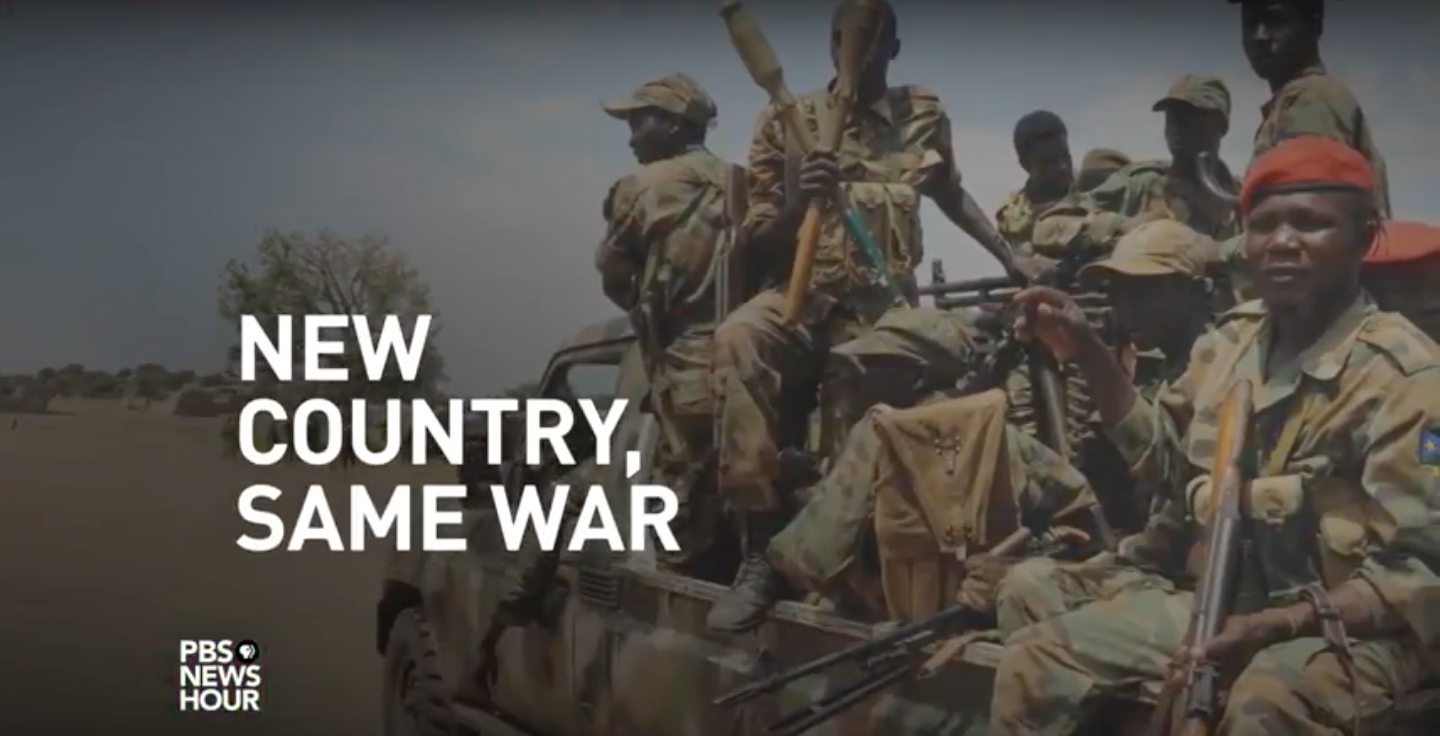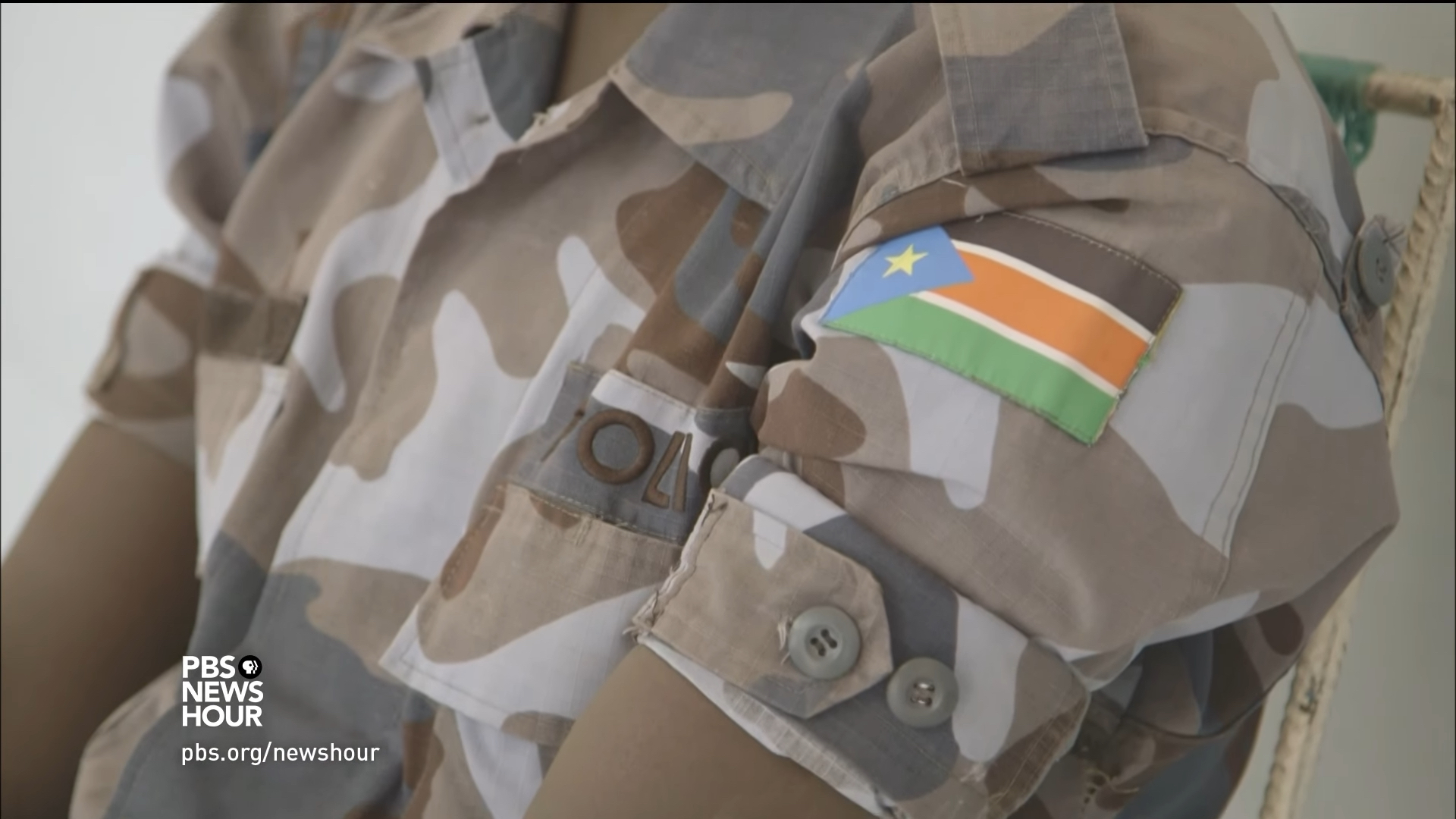
WILLIAM BRANGHAM: The world's youngest country is tearing itself apart. South Sudan was founded in 2011, but, two years later, forces allied to the president and vice president began fighting each other. That civil war has now led to the near collapse of the country.
Tonight is a look at this brutal war and its tribal roots.
And a warning: Some images and stories in this report are disturbing.
JANE FERGUSON: This was once a busy market town. Villagers from the countryside would come to Leer to trade goods and catch up on news. Now there is no one. All the people have fled into the bush, hiding from violent raids by government soldiers.
We found some of them a few miles away in rebel-held land. They had crept out of hiding to get help from aid agencies. Without it, they will starve. Their stories of what they have endured are horrifying.
RUOT MACHAR, Displaced Person (through interpreter): The government is killing men, women and children, and sometimes they even cook the dead bodies and force us to eat them. My 5-year-old daughter was slaughtered, and they made me eat her body.
JANE FERGUSON: Tales of such brutality are common in South Sudan's civil war. A fallout between president Salva Kiir and his vice president, Riek Machar, began in 2013, tearing the country along tribal lines.
Kiir is from the Dinka tribe, Machar from the rival Nuer tribe. Fighting between the two sides soon involved other subtribes. Battles broke out across the country. Murderous raids on civilian communities are a favored tactic, according to Jonathan Pedneault of Human Rights Watch.
JONATHAN PEDNEAULT, Human Rights Watch: Both opposition and government fighters see various specific ethnic groups as being supportive of their — either of their opponents. And in order to decrease the military capacities of their opponents, they decide to target civilians, because, without civilians, those fighters won't have a place to stay, they won't receive food, they won't receive popular support.
So, the aim by targeting civilians is, in effect, to cut the grass under the feet of those fighters.
JANE FERGUSON: This is what ethnic cleansing looks like. Entire populations of specific tribes are being forced out of areas in South Sudan.
Malakal town was a mixture of tribes. Government and opposition forces have been fighting over it throughout the war, both committing atrocities. Each time the town changed hands, civilians of a specific tribe were targeted. It's now controlled by Dinka government soldiers.
Entire neighborhoods, where the Nuer and other tribes at risk used to live, lay silent and empty, the grass reclaiming streets that used to be home for so many.
We are not allowed to get out and film in the town center. There's lots of police and army around, but what there aren't are civilians who live here. This was once South Sudan's second biggest city. And the streets and neighborhoods are completely abandoned now. Civilians are fleeing towns and cities across South Sudan because of repeated attacks. And they're just turning into ghost towns.
They ran to this camp just outside the town. It is a dusty, miserable place, where sewage runs between shacks and desperately poor survivors of the violence try to go on living.
Elizabeth is one of them. A single mother of six, she sells cups of tea in the camp to earn some money. But the memory of what happened in the town is always with her.
ELIZABETH SHOL ROUT, South Sudan (through interpreter): I saw many people killed, including my brother. They called my brother to come out of the house and shot him in front of me.
JANE FERGUSON: The only thing standing between her and the government soldiers are U.N. peacekeeping soldiers. They guard this camp and others like it across South Sudan, trying to stop more massacres.
The U.N. said in December in a statement South Sudan is on the brink of all-out genocide, similar to what happened in Rwanda in 1994. And yet its peacekeepers seem unwilling or unable to stop it.
Last year, government soldiers forced their way into the camp, and over several days murdered more than 25 people and injured and raped many others.
Elizabeth shows us where they came in. She remains bitter that the U.N. soldiers didn't stop them.
ELIZABETH SHOL ROUT (through interpreter): They did nothing. When they saw the soldiers cut the fence and come into the camp, they just opened the gate to allow the people to escape.
JANE FERGUSON: There are over 13,000 U.N. peacekeeping soldiers in South Sudan. More than 200,000 civilians have fled to their bases across the country when targeted by the violence, forcing the U.N. to create guarded camps in order to protect the people.
Despite having authority to use force if needed to stop attacks against civilians, the peacekeepers have come under criticism for not doing so when attacks have happened in front of them.
MOUSTAPHA SOUMARE, United Nations: Peacekeeping, and that's all it is. It's really you keep peace. So, normally, the people who come in peacekeeping, the troops and so on, are really prepared in the spirit of peacekeeping, not really entering into direct fight.
JANE FERGUSON: Despite this, he says the U.N. have now pushed their forces to improve.
MOUSTAPHA SOUMARE: They have been instructed that, if you see something like that, you make a warning shot. If people are — really not responded, you can actually use your firearm on that.
JANE FERGUSON: South Sudan is the world's youngest nation, and the international community played a major part in its creation. After decades of devastating civil war with the North, South Sudan finally won its independence with a referendum in 2011.
American church groups and politicians had campaigned for the peaceful birth of the nation for years. But it was South Sudanese fighters, community leaders and advocates who sacrificed so much to see this country find its freedom.
One of them was Alfred Taban. A veteran journalist and newspaper editor, he was jailed and tortured repeatedly for years in the northern capital of Khartoum for calling for independence.
ALFRED TABAN, Journalist: Well, I knew we were going to succeed. I knew we had not — we had not done anything bad. We were struggling for our rights as human beings. And that's what led me to survive. I knew we will succeed.
JANE FERGUSON: After sacrificing so much for his country, its rapid descent into civil war has broken his heart.
ALFRED TABAN: The killing of one another started, the Nuers being killed, the Dinkas being killed and other tribes, then I knew things had really gone bad. Then I knew that partly we — or they themselves, they were not only struggling for the people, but they were struggling for themselves to lead or to rule. I became very, very disappointed.
JANE FERGUSON: In frustration, he wrote a column in the newspaper he runs calling for the leaders of both sides in this war to step down. Shortly after, the government he sacrificed his freedom for jailed him for nearly two weeks.
ALFRED TABAN: They were not struggling for their people. They were struggling for themselves. And this is why really the struggle of the people of South Sudan has been hijacked from the very beginning. It has become a struggle for position and wealth, not a struggle for the betterment of the lives of the people of South Sudan.
JANE FERGUSON: Yet neither side in this war is backing down. It is spiraling into a frenzy of ethnic-driven murder and revenge. The dream of a peaceful South Sudan is dying with its people.
For the PBS NewsHour, I'm Jane Ferguson in Juba, South Sudan.
WILLIAM BRANGHAM: For the record, the South Sudanese information minister canceled an interview with Jane Ferguson to respond to charges against the government.
Tomorrow, Jane reports on the famine that the war has caused.







